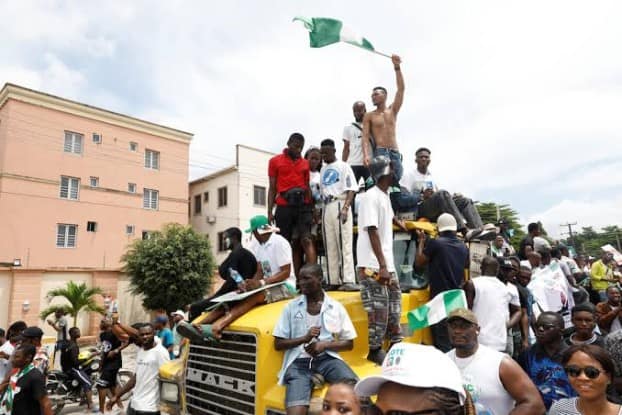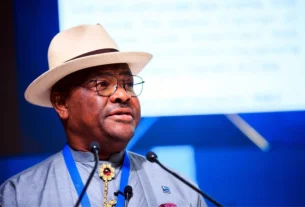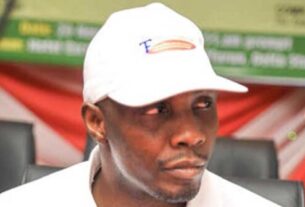by Salihu Moh. Lukman
Kaduna
Many Nigerians believe that the situation in the country is hopeless. Our problems are so entrenched and deep-seated. Politically, economically, socially, culturally and even religiously, the problems are overwhelming and all encompassing. The belief of citizens is that it is almost practically impossible to produce leaders who can pull Nigeria out of its present quagmire. This belief is further re-enforced given that the opposition political leaders as presently constituted are part of the political leadership of the country who brought the country to its present state of hopelessness. In virtually every respect, however one wishes to consider challenges confronting us as a nation, negative and overwhelming interpretations are most likely to dominate assessments. Given such ugly daunting reality, what is the future of Nigeria? What is it that Nigerian political opposition can do to develop a new outlook that can make it to measure up to the responsibility of rescuing the country?
The challenge of responding to such basic practical questions in these contemporary times is quite troubling given the fact of progressive degeneration of realities facing citizens. Conditions of life just keep getting worse with every passing day. The expectation that democracy will produce better leaders who can be selfless and honest in managing public affairs has been a far cry. Even when popular leaders win what could be adjudged as free, fair and credible elections, as was the case with former President Muhammadu Buhari and APC in 2015, they end up falling short of public expectations.
Admittedly, as it is, the reality is that bad as former President Goodluck Jonathan was, former President Buhari turned out to be worse and, in every respect, failed to justify the confidence of Nigerians. And now President Asiwaju Bola Ahmed Tinubu is proving to be worse than former President Buhari. Within less than two years, President Tinubu has made lives unbearable for all Nigerians in a magnitude never experienced in the history of the country. Beyond making life unbearable, President Asiwaju Tinubu has also created the political paradox of being an elected leader who has succeeded in weakening structures of his party. Under his leadership all political parties have been similarly weakened. Consequently, Nigeria is a so-called democracy without any functional political party.
Interestingly, contrary to being a progressive democrat, President Asiwaju Tinubu is about the most insensitive political leader Nigeria has seen. Insensitive both in terms of being unconcern about the consequences of the policies of his government on the welfare of citizens as well as being inaccessible to engagement and demonstrating any commitment to accommodate and mobilise citizens to support his government. As a result, virtually, all democratic structures that are expected to facilitate engagements with governmental structures are systematically and deliberately being weakened. For instance, the structures of the APC, which is the ruling party that produced President Asiwaju Tinubu are being demobilised. Except for the NWC, none of the organs of the party are functioning.
All the other registered parties are in one way or the other being held to ransom with syndicated leadership crisis. The two chambers of the national assembly have been debased to the status of parastatals of the Presidency. INEC is sadly regressing back to the Maurice Iwu days and elections are becoming more and more predictable circus shows. All the progress made following the Justice Mohammed Uwais’ Electoral Reform work of 2009 have been jettisoned. Even basic function of conferring legal recognitions to political associations with legitimacy to participate in electoral contests are being sacrificed or blocked.
It is such a big irony that it is under APC and President Asiwaju Tinubu that Nigerian democracy is being undermined on a scale almost equivalent to what a military regime would have done when it overthrew an elected government. Perhaps, the only difference is the symbolic retention of the constitution, the legislative arm of government and INEC without the corresponding statutory powers that organically subordinates these potentially veritable democratic structures to Nigerian citizens on account of which sovereignty will truly lie with the people.
Partly because of this reality, political competition in the country is eroded. We are having elections without contests, which are producing emperors at all levels whose mission is simply to conquer Nigerians. From President Asiwaju Tinubu to Governors, down the line, the average mentality of politicians is to manipulate so-called elections and be returned as so-called winners of stage-managed elections. Across board, Nigerian politicians are characterised with high levels of intolerance, with basically zero capacity for debates and engagements. This is largely responsible for the current unfortunate reality whereby Nigerian politics is distanced or remotely associated or connected with the interests of Nigerians.
Part of the challenge that must be responded to has to do with the big question of what to do to address all the multifaceted deep-seated problems of citizens. The legitimate question being asked is about whether politicians are only interested in taking advantage of the problems created by the APC and President Asiwaju Tinubu to capture power and basically replicate what previous governments have done and end up becoming worse than the APC and President Asiwaju Tinubu. Bearing the experiences of Nigerians with APC, former President Buhari and now President Asiwaju Tinubu, these are very legitimate questions.
Unfortunately, as it is, most Nigerian politicians, including opposition leaders take these issues for granted. Many believe that they can continue to manipulate their way to so-called electoral victory. A note of warning may be important at this very early stage of political organising for the new political opposition. The only thing that can guarantee the defeat of APC and President Asiwaju Tinubu in 2027 is if an opposition political platform can be created, which will have strong relationship with Nigerians. Capacity to have strong relationship is a function of developing the new orientation or outlook.
This is not going to be easy to achieve. The hard truth is that, if APC with all the promises of CHANGE before 2015 ended up producing the current disappointment, why should Nigerians trust any politician who will come with similar promises of producing a better future for Nigerians? And noting that in any case most of the opposition politicians were part of the 2015 APC campaign, which promises Nigerians CHANGE, why should Nigerians trust the newly re-organised opposition politicians?
The point is, there is the need to acknowledge these legitimate issues. The campaign to rescue Nigeria must not be founded on the cheap sentiment of defeating the APC and President Asiwaju Tinubu in 2027. It must be founded on a clearly well thought out vision of moving Nigeria forward. Accordingly, the first vision should be about the kind of political platform the opposition want to create. Are we going to have another party whose business will only be about producing candidates for elections? In which case, are we just looking at a party that will produce XYZ as the Presidential candidate and down to Governorship, Senatorial, House of Representatives and House of Assembly candidates?
Once that is the focus, we will end up with a new opposition party that is weak and unable to be different from APC, PDP, LP, NNPP and all the current parties. In fact, the new opposition parties may even be weaker than the existing parties. The first indicator that this will be the result is when opposition leaders reduce negotiation to produce the new opposition party to installing their surrogates as party leaders. This will result in hegemonic struggles to plant so-called loyalists of aspiring candidates as leaders of the new party at various levels. The consequential outcome will be the emergence of worse leaders who will continue the political culture of elected leaders functioning as emperors and overlords, irrespective of whether it is Alh. Atiku Abubakar, Mr. Peter Obi, Sen. Rabiu Kwankwasau or any of the leading opposition leaders as the Presidential candidate.
There is therefore the need to challenge opposition political leaders to demonstrate stronger commitment to break away from these destructive practices that reduces political parties to only serving as election platform for electoral contest, which is at the root of the crisis of Nigerian democracy. The best way to break away from these practices is to ensure that leaders of the new opposition party are frontline members of the opposition, not surrogates. This will require, for instance, that at the least some of the frontline opposition political leaders, notably, Alhaji Atiku Abubakar, Mr. Peter Obi, Sen. Rabiu Musa Kwankwasau, Sen. Aminu Waziri Tambuwal, etc. should be among the leaders of the new party serving as National Chairman, Deputy National Chairman, National Secretary, etc. And of course, the frontline leaders should also include the alienated leaders of APC who will commit themselves to building the new political opposition party. These alienated APC leaders include Prof. Yomi Osinbajo, Chief Rotimi Amaechi, Dr. Kayode Fayemi, Mallam Nasir El-Rufai, Ogbeni Rauf Aregbesola and the old CPC tendencies, etc.
The point is that the profile of the leadership of the new opposition party being formed will confirm whether the political agenda of rescuing Nigeria is reduced to only winning elections without the corresponding commitment to ensure the emergence of strong party capable of regulating the conducts of elected representatives. Once the profile of leaders of the new party excludes the frontline opposition leaders, it simple means business-as-usual. That was what happened in the case of APC, which was why some of the critical issues related to party funding remained ad hoc till today.
If at all opposition leaders are seriously commitment to rescuing Nigeria, resolving the challenge of party funding must be prioritised. Associated with issues of funding is about ensuring proper budgeting that should cover remunerations and conditions of service for party leaders at all levels. This should be benchmarked with public service conditions such that party leaders enjoy the same privileges with elected representatives on account of which the needed funding is mobilised appropriately and accordingly based on compliance with subsisting legal requirements. The other issues which the budget must cover include making adequate provision to meet operational cost especially election financing.
The absence of budgeting and clear funding framework is responsible for the current exploitative and extortionist high cost of nomination forms across all parties. This has created the sad reality of highly skewed exclusivist orientation whereby only the super-rich in Nigeria can participate in election across all parties. There is also the urgent need for the new opposition political platform to be strongly commitment to engendering new inclusive and people friendly orientation, which can open Nigerian elections to broader participation by citizens across all sections of the country. Guaranteeing inclusivity would require that the new party is popular in every part of the country and across all diverse groups.
Broader participation by citizens across diverse groups has the added advantage of strengthening the support base of the new opposition party. Beyond that, it also has the potential of broadening the scope for leadership recruitment beyond the current narrow base of old politicians. If anything, the distrust of Nigerians with the current narrow base of old politicians is very strong. In fact, as it is Nigerians are very suspicious of all the campaigns about defeating APC and President Asiwaju Tinubu in 2027 largely on account of the distrust Nigerians have for old politicians. This will most likely change once opposition political leaders are able to demonstrate strong commitment to broaden the scope of leadership recruitment in the country beyond the narrow scope of old politicians.
The issues of governance and how much commitment is demonstrated in terms of responding to concrete challenges facing citizens are the other factors. Again, given the poor records of APC in terms of being unable to deliver on campaign promises, Nigerians would expect more practical approaches that demonstrate both humility and experiential knowledge of initiatives required to respond to existential challenges facing citizens in the country. For instance, proposals around economic management must go beyond doctrinaire prescriptions, which for decades hold the economy at stand still. Ability to create jobs and expand the earning capacity of citizens should be well outlined in clearly unambiguous terms.
Hydra headed challenges of guaranteed security of lives and property must be resolved with references to recruiting more security personnel, training and equipping them adequately in line with international standards. Mobilising all the necessary funding to achieve that must be given all the priority required. For opposition leaders to demonstrate strong commitment to resolving Nigeria’s security challenges would require visionary and highly ambitious plans of mobilising large-scale funding into the Nigerian security sector.
The other sectors, which large-scale funding will be required are education, health and agricultural sectors. Specifically, Nigerian political opposition must prioritise construction of new primary and secondary schools, expanding existing ones through construction of additional classroom blocks, recruiting teachers on a mass scale, making adequate provisions for teaching materials, including making provisions for accommodations for teachers and staffs. With reference to the health sector, there must be strategic initiatives to ensure the existence of primary healthcare centres, hospitals and access to healthcare services across every part of the country. Nigeria must aspire to meet the healthcare needs of Nigerians and within the shortest possible time end the current brain drain of medical doctors and health service workers in the country. In addition, medical tourism by Nigerians, especially political leaders must discontinue immediately.
With respect to the agricultural sector, clear production targets should be set for agricultural outputs based competitive advantages. In addition, initiatives for processing activities to add value to agricultural products should be envisioned and plotted as part of the drive towards industrialisation in the country. The reality is that these four sectors, security, education, health and agriculture hold the key in terms of whether Nigeria will make progress as nation or not. In fact, arguably, the inability to develop these sectors are the root of all the crisis facing the country. The reality that human life in Nigeria is going back to Hobbesian state of being ‘solitary, poor, nasty, brutish and short’ has to do with the deepening crisis in these four sectors on account of which human life is more and more becoming meaningless in the country. Inability of governments at all levels to effectively respond and transform the lives of citizens is at the centre of all the frustrations of Nigerians.
Achieving all these require strong synergy among governments at all levels. Developing such synergy is more about the orientation of relationship between Federal, States and Local Governments. As it is, synergy and orientation are very weak and often taken for granted. Painfully, although during its formation, APC had some robust debates around what is to be done to resolve the security challenges, once it won the election in 2015, all the campaign promises made were abandoned and were not used to guide policy orientation for governments at all levels. The same disposition of abandoning campaign promises has continued under the current administration of President Asiwaju Tinubu as the campaign promise of Renewed Hope has been similarly abandoned and is hardly a guide for the policies of President Asiwaju Tinubu government.
Nigerians will want to see opposition political leaders honestly committing themselves towards developing a new marshal plan for the country around these issues. Based on the envisioned marshal plan, the opposition political leaders should demonstrate commitment to raise annual national budget of the country at least N150 trillion from the current unambitiously less than N40 trillion. Similarly, the new reorganised political opposition in the country should commit itself to raising the annual budgets of all states’ governments in the country to not less than N1 trillion. Now, only Lagos State operate an annual budget of more than N1 trillion.
A good indicator that Nigerian opposition leaders are engaging these issues honestly with strong commitment to rescue Nigeria will be first determined by the nature of political organisation being formed. Beyond ensuring that frontline opposition leaders are part of the leadership of the new opposition party, is the leadership of the new party able to mobilise enough funding to guarantee smooth operations of the party, including engendering deeper consultations with party members and by extension Nigerians to secure the support and buy in of Nigerians? Do the activities of the new party include organisation of basic orientation, mentoring and coaching sessions for leaders of the party and by extension aspiring candidates at all levels to facilitate new political orientation and culture in the country? In other words, is the new opposition political party going to be limited to being an election platform or will it serve as a broad political platform capable of expanding the recruitment base for competent political leaders in the country?
Will Alh. Atiku Abubakar, Mr. Peter Obi, Sen. Rabiu Musa Kwankwasau and all the prospective opposition leaders submit themselves and serve as the agents that will midwife the emergence of the envisioned broad opposition political platform in Nigeria? Or will they remain only fixated with their narrow ambitions of emerging as candidates for 2027 elections? Based on all the ongoing consultations among opposition leaders in the country, although all these leaders have ambitions to contest elections, in varying degrees, they all are commitment to the progress of Nigeria. The big challenge is whether negotiations among opposition leaders will be broadened to the level of inviting wider participation of Nigerians, which can challenge Nigerian politicians to prioritise taking up the responsibility of party leadership.
Taking up the responsibility of party leadership boils down to the question of whether opposition leaders will prioritise being part of the political team that could midwife the emergence of good leaders in the country. The alternative will be whether opposition leaders will reduce the current initiative to organise a new political platform to imposing themselves and emerge as candidates for 2027 elections with all the high probability that they may become worse than current leaders. While for many who are gripped by all the attractions of static analysis, the temptation is to dismiss opposition leaders and condemn them as incapable of being part of the political team that can midwife good leaders in the country, one can say with all the benefit of relationship with opposition political leaders that they all are quite worried and disturbed by realities facing the country. In varying degrees, these leaders want qualitative shift in the politics of Nigeria and to that extent therefore would prioritise the emergence of distinctively broad political planform in the country.
As Nigerians, we must also commit ourselves to make the emergence of the new broad political platform possible. We must, as Nigerians have the belief, courage and determination to compel leaders to act in the direction that can produce the desired result. It is all about being positive. One can say, with all the confidence, that so far so good; the disposition of Nigerian political opposition leaders is to unite and overcome the current challenges of Nigerian democracy. A good section of the opposition political leaders is already focussed on ensuring that the unity of opposition leaders produce the needed distinctive political platform capable of engendering wider participation of Nigerians. God willing, it shall succeed, and Nigerian democracy will be reborn, and Nigeria’s greatness will be achieved. In our lifetime, Nigeria shall be great!








